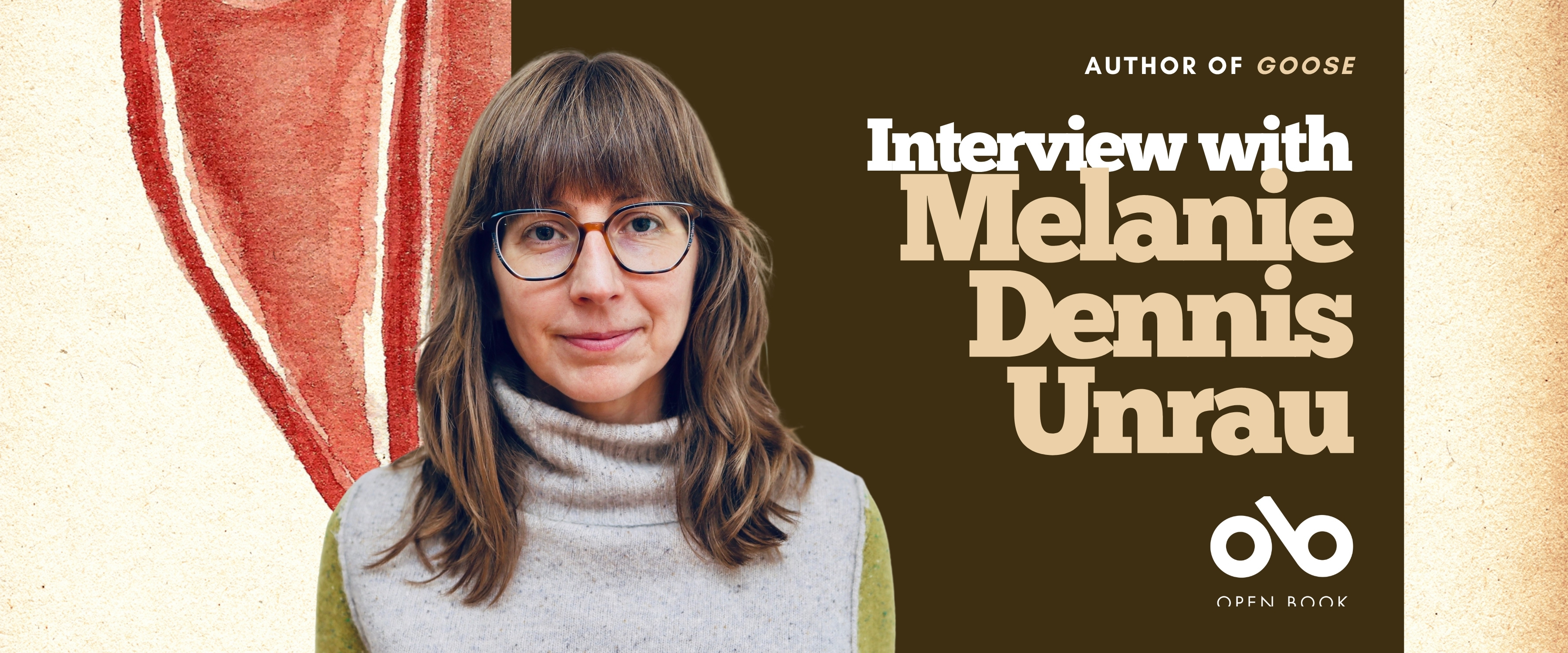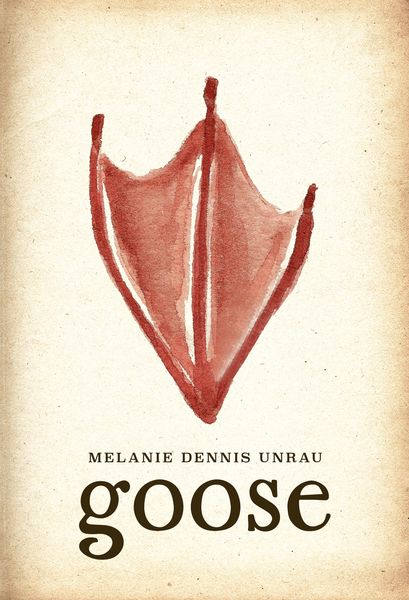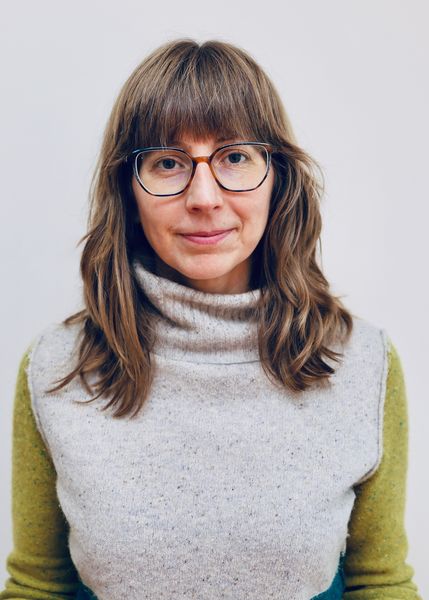Melanie Dennis Unrau Excavates History and Language in the Poetics of GOOSE
In the exciting new collection, Goose, poet and researcher Melanie Dennis Unrau reimagines the language of industry as poetry, unearthing new meanings from the pages of Northland Trails by S. C. Ells, the so-called “father of the tar sands.” In this striking collection, Unrau turns Ells’ early twentieth-century reflections on the Athabasca region inside out, transforming archival fragments into sharp, lyrical meditations on land, power, and extraction.
Unrau writes like a tracker moving across unpredictable terrain, following traces of thought, irony, and ecological grief. Her poems question what it means to record and possess, asking how humans, animals, and the land might speak together after centuries of being written over.
Playful, haunting, and fiercely intelligent, Goose is a poetic act of reclamation—an excavation of history and language that exposes both their wounds and their beauty.
Check out this fascinating Poetry in Perspective interview with the author!
Open Book:
Are there any new poetic forms that have inspired you in recent years?
Melanie Dennis Unrau:
I read a lot of ecopoetry, activist poetry, work poetry, and Indigenous poetry. My new book Goose (Assembly, 2025) is inspired by poetry that works with or on archival, historical, and legal/official texts—like Jordan Abel’s The Place of Scraps and other works, M. NourbeSe Philip’s Zong!, Sonnet L’Abbé’s Sonnet’s Shakespeare, Layli Long Soldier’s Whereas, Matthew James Weigel’s Whitemud Walking, Syd Zolf’s Janey’s Arcadia, and Lesley Battler’s Endangered Hydrocarbons.
Also, visual poetry (check out Judith: Women Making Visual Poetry, edited by Amanda Earl), river poetry like Rita Wong and Fred Wah’s beholden and Sophie Ann Edwards’s Conversations with the Kagawong River, and collaborative activist projects like Watch Your Head and The Enpipe Line.
Goose is also inspired by Kate Beaton’s comics—especially Ducks—and Lindsay Bird’s poetry collection Boom Time, along with other oil-worker poetry I’ve been studying as a literary scholar for the past ten years. And I’m excited about the poetics and politics of the poetry workshop that Worker Writers School convener Mark Nowak writes about in Social Poetics.
OB:
What part of the creative process in writing poetry is more important to you? How much time do you spend on craft, theme, intended effect, or other elements of your work?
Your CanLit News
Subscribe to Open Book’s newsletter to get local book events, literary content, writing tips, and more in your inbox
MDU:
Goose was a situation where it was always craft, theme, intended effect—all at once. It’s a political and aesthetic research-creation project where the creative process and the theme or politics are inseparable from one another.
It took me a long time to circle around this project before I figured out what the concept was and how I was going to make the book. I knew that there was something (or several things) bothering me about the source text I was working with—“father of the tar sands” S.C. Ells’s book Northland Trails—and that I wanted to use the figure of the goose in that book, and the literary-critical tool of poetry-writing, to figure out and write about that thing.
So, I guess I started with the politics—in this case, a colonial, racist, sexist extractive ideology I wanted to critique—but I had to figure out the method and poetics before I could even begin. I had to hold the poetics and the politics together all the way through, in each poem and in building the book, for it to work.
I’m a literary scholar, and I write papers the same way—building from start to finish as a complete thing, with a whole lot of thinking and circling ahead of time to get to the point where I can start, and without knowing until I get to the end where or how it will end.
OB:
Does poetry have a special function that sets it apart from other forms?
MDU:
Yes, it does, because in our culture we’ve given it certain special functions—like offering words for the unspeakable at funerals and in moments of tragedy or at protests, and as a medium for saying the things that elude us when we are in love or feeling grateful, nostalgic, or mournful (think song lyrics and greeting cards).
There’s a kind of social consensus that poetry helps us put into words things that are difficult or unformed or on the tips of our individual or collective tongues. Poetry has permission to be blunt and challenging in interesting ways. What a privilege to work in such a form, and to be able to play or innovate within it.
I wish there weren’t also a general sense that poetry is difficult or inaccessible, but that’s one of the challenges of writing and loving poetry—trying to push back at that perception and to make poetry that invites people in.
OB:
Is the world of poetry more exciting now than it has been in the past? In what ways?
MDU:
I love the effect of the social-media poets, even though I’m not a social-media person. Working on the poetry anthology I’ll Get Right On It: Poems on Working Life in the Climate Crisis (Roseway, 2025), I enjoyed talking with non-poets or new poets, hearing what they love, and helping them write and edit their own poems.
I think the definition of what counts as good poetry or real poetry is expanding, and that’s a great thing. I could just as easily say I love so-called innovative poetry—and I do love it, especially when it has something interesting to say—but I want to see poetry continue to become more accessible, engaged, and friendly.
OB:
What can poetry do to impact lives in the face of an ever-changing or uncertain world?
MDU:
In I’ll Get Right On It, we editors claim that poetry is a medium for expressing the experiences and feelings of working people enduring climate change, capitalism, extraction, racism, colonialism, sexism, ableism, heterosexism, anti-migrant and anti-trans laws and attitudes, and genocide—and that poetry can also be a mode for building solidarity, care, and resistance.
I find it harder to make that claim as an individual, about my own poetry, but I guess that’s the dream. Goose makes fun of and draws attention to destructive ideas that are foundational not only to the tar sands but also to Canada. It’s a call for land back, no more fossil fuels, and climate justice. Hopefully it helps people think—and maybe think differently—about these things.
______________________________________
Melanie Dennis Unrau is a poet, editor, scholar, and climate organizer of mixed European ancestry from Winnipeg, Manitoba, traditional territory of the Anishinaabeg, Ininiwak, Anishininewuk, Dakota Oyate, and Dene peoples and the homeland of the Red River Métis. She is the author of the literary study The Rough Poets: Reading Oil-Worker Poetry (McGill-Queen’s UP, 2024) and the poetry collection Happiness Threads: The Unborn Poems (The Muses’ Company, 2013). A former editor of The Goose journal and Geez magazine, Melanie also co-edited I’ll Get Right on It: Poems on Working Life in the Climate Crisis (Fernwood, 2025).






